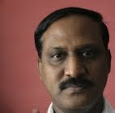“Mercy-grace-peace do not touch Golpitha.”
—From Vijay Tendulkar’s introduction to Golpitha
On
July 9, 1972, Dalit writers Namdeo Dhasal, Arjun Dangle and J.V. Pawar
met in Bombay and established the Dalit Panthers, a radical militant
outfit that sprang out of Maharashtra’s Dalit literary movement. It was
the silver jubilee year of India’s independence but the Panthers
observed a ‘Black Day’, with black-flag demonstrations all over Bombay,
protesting the exploitation and oppression of Dalits.
That same year,
Golpitha,
a collection of poems by Bombay taxi driver Dhasal, had created a storm
that was to blow away the traditional Marathi literary citadels, while
also establishing Dalit poetry as a distinct stream of literature in the
country.
Golpitha, named after a slum area in Bombay, created
an imagery, vocabulary and landscape completely unknown to Indian
literature and set the tone for a new Dalit expression:
“My everything amber
Sky alchohols in the glass
Let breath reel stagger
Let snake-vines keep the beat move shake
The raga of gutter-ganges
Let the donkey under your skin bray
Let flow the pain, the dark serpent, the charging boar
Let the balls sizzle
An honest beast in your torch
Now is yours
Sell cheap faith-in-Christ, family plan your vulgarity
Kick this heavenly virtue, this fatherly atrocity
This poor promising puking lamb
Crumpled-paper-Pandurang-dindi goes on singing
Winding
The sweet notes flute
Juhu beach fragranced
A quarter jingle jangles
Daughters wed between their thighs
Uncle Uncle Little Star
Strumming
The delicate guitar of impurity
Listen to the dainty ankle bells
Come come come come God
Crush the frogs in the earthenware pot
Blow out the lamp
Of the umpteen generations
Suck, drool over the pelvic bone
My essence droops drunken
Why pull it up
For everyone in front of everyone the wine filled glass.”
(From Amber in Golpitha)
Dhasal continued in the anthology:
“Made so beggarly it is nausea to be human
Cannot fill shrivelled gut even with dirt
Each day just supports them as if bribed
Not a sigh slips through the fingers of day’s plenty as
We are cut down.”
Ambedkar scholar Eleanor Zelliot says, “Nothing is sacred to Dhasal,
except possibly his own creative gift and the memory of a man (Dr B.R.
Ambedkar) who believed in the creative powers of his own untouchable
people.”
“The Lord of the people is never ugly
He is from among men
True
Holy
Beautiful
Babasaheb Ambedkar
Is true, holy, beautiful
Otherwise this book has no meaning
I write all this night
It’s three o’clock
Thought I want to have a drink
I don’t feel like drinking
I only want to sleep peacefully
And tomorrow morning see no varnas
(From Tuhi Iyatta Kanchi, 1981).
As a tribute to Ambedkar, Dhasal wanted to, not dream, but wake up
and see no caste in the country. He went on to defy caste in the 10
volumes of poetry and three volumes of prose that was to pour out of
him.
Even as the Dalit Panthers fragmented very quickly into distinct
streams, the poet in him was in fervour. Dhasal was prolific;
recognition came in waves too. The Maharashtra government awarded
Golpitha,
and Dhasal’s acceptance of it did cause heartburn among the rest of the
Panthers. There was even talk that he’d become part of the
establishment (an allegation that never really went away, what with his
column for
Saamna). But that award got him noticed in the English media. On November 25, 1973, the
Times of India’s weekly supplement introduced Dalit literature and Dhasal’s poetry to the reading public.
Meanwhile, Zelliot, who was editing the Journal of South Asian
Literature, included his translations and an essay by Dilip Chitre in an
issue (1982), Laurie Hovell published him in
Translations (1986), and V.S. Naipaul wrote about him in his
India: A Million Mutinies Now
(1990). A Padma Shri also came calling in 1999. But the biggest award,
to Dalit literature and to Dhasal, was the Sahitya Akademi Golden
Jubilee Lifetime Achievement award in 2005. The late Dilip Chitre, his
long-time friend and translator, published a collected works in 2007,
Namdeo Dhasal: Poet of the Underworld, Poems 1972-2006.
For Indian literature, Dhasal announced early on the beginning of the
breaking of literary shackles and caste barriers. By the time he left us
on the streets of Mumbai, he’d set the Dalits on the road to literary
freedom, their weapon the choicest of words to flay an oppressive
society with.
(The author is an IAS officer)



1 Comments:
A tribute that does justice to the man and the poet!
Post a Comment
<< Home